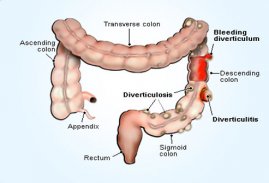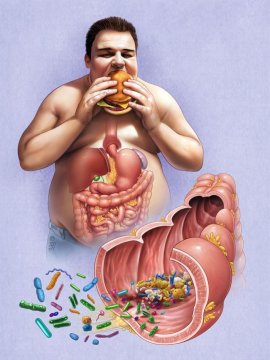
New Study Links Red Meat to 58% Higher Chance of Developing Painful Diverticulitis
More motivation to eliminate meat from the diet comes from a new study showing that eating unprocessed red meat is linked to an increased risk of getting an inflammatory bowel condition.
Researchers analysed information about the diets of more than 46,000 men in the US, of whom 764 developed the condition, called diverticulitis, over a period of 26 years. Those who ate the highest amounts of red meat had a 58% higher chance of getting the disease compared to those who consumed the least, the study found.
 Diverticulitis is a common bowel condition that occurs when small pockets or bulges lining the intestines become inflamed with painful abscesses. It results in more than 200,000 hospitalizations a year in the U.S. alone at a cost of more than $2 billion USD.
Diverticulitis is a common bowel condition that occurs when small pockets or bulges lining the intestines become inflamed with painful abscesses. It results in more than 200,000 hospitalizations a year in the U.S. alone at a cost of more than $2 billion USD.
It is estimated 5% of people in the UK have diverticulitis by the time they are 40 years old and at least half have it by the time they are 80, according to the NHS.
After adjusting for factors such as smoking, exercise, medication use, and fiber intake, they found that those who ate the most red meat had a 58% increased risk of developing diverticulitis compared with those who ate the least. Each daily serving of red meat was associated with an 18% increased risk, although that risk peaked at six servings a week.
It is not yet understood why eating red meat increases the risk of bowel disease, but researchers suspect that unprocessed red meat could upset the community of bacteria - known as the microbiome - that lives inside the human gut.
Lead author Andrew Chan, MD, program director of the Gastrointestinal Training Program at Massachusetts General Hospital, says more research is needed to determine exactly how red meat is linked to diverticulitis. But studies suggest that high consumption alters the balance of bacteria in the gut, he says, which could affect the body’s immune response and vulnerability to inflammation.
Dr Yin Cao, from the Massachusetts General Hospital and Harvard Medical School, said in the British Medical Journal: "We identified unprocessed red meat, but not processed red meat, as the major driver for the link between red meat and diverticulitis.
Unprocessed meats like beef, pork and lamb were associated with a greater risk over processed meats like bacon or sausage, however processed meats were recently linked to an increased risk of cancer.
Dr Cao said: "Recently, the incidence of diverticulitis has been rising, particularly in young individuals.
The findings should offer yet another reason to consider cutting back on red meat, according to Samantha Heller, a nutritionist at New York University Langone Medical Center in New York City.
Diets high in red and processed meats have been linked with increased risks of inflammatory bowel diseases, so the link found in this study "is not surprising," said Heller.
"Focusing on a more plant based, higher fiber diet that includes legumes, whole grains, nuts, vegetables and fruits, replete with appropriate fluid intake, may go a long way in helping reduce of inflammatory bowel diseases, diverticulitis, and other chronic diseases," Heller added.
The study was published this week in Gut, a leading international journal in gastroenterology and hepatology which has an established reputation for publishing first class clinical research of the alimentary tract, the liver, biliary tree and pancreas. Gut is an official journal of the British Society of Gastroenterology.
Subscribe!
Love this content?
Receive our awesome newsletter straight to your Inbox!

 Your email address will always stay private.
Your email address will always stay private.


























Comments